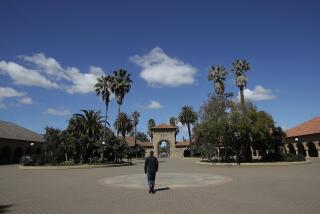Harvard Urges Others to End Early Admissions
- Share via
Harvard’s president said Tuesday that the university’s decision to end early admissions was aimed in part at tamping down the growing frenzy over how students gain entrance to the nation’s top institutions.
In announcing the decision, Harvard said such programs tended to benefit more-affluent students at the expense of minorities and the poor.
“The college admissions process has become too pressured, too complex and too vulnerable to public cynicism,” said Harvard’s interim president, Derek Bok. “We hope that doing away with early admissions will improve the process and make it simpler and fairer.”
The change will take effect next fall for those seeking entrance in fall 2008. Harvard plans to reconsider the decision if the academic quality of applicants suffers as a result.
Although other prestigious universities have fine-tuned their programs in recent years, Harvard is believed to be first among the nation’s top-tier institutions to eliminate early admissions.
Harvard urged other universities to follow suit, but it was not clear Tuesday how many would do so soon. Officials at Yale and Stanford said that they would review their policies, but that they had no immediate plans to change.
Early-admissions policies have existed for at least 20 years, but their use has been increasingly criticized as giving an unfair benefit to students at elite private and wealthy public high schools whose families and counselors tend to be savvy about college admissions.
Several hundred of the most competitive campuses offer a form of it; some accept a third or more of their freshman classes early. Other major schools, including USC and the University of California, do not use it.
Under the programs, high school students try to increase their chances of being admitted by applying early in their senior year. By December, months before other applicants, they learn whether they have been accepted, rejected or deferred until the regular admissions cycle in the spring.
Harvard, Stanford and Yale, among others, use a nonbinding form of early admission known as “early action,” in which students apply and are accepted early but are not required to decide until spring of their senior year where they will attend. This allows them time to consider other admission and financial aid offers.
Other schools, including Princeton University and Pomona College, use a more controversial form known as “early decision,” in which applicants must commit to attending.
Richard H. Shaw, Stanford’s dean of admission and financial aid, said Stanford would study Harvard’s action but would “make its own decision” on the matter.
Lloyd Thacker, executive director of the Education Conservancy, a Portland, Ore.-based group that advocates such reforms in college admissions, said Harvard’s example would be influential.
“The ripple effects are going to be big and most welcome,” he predicted.
Early applications are promoted as “a gimmick” to help students when in fact they are “institutional strategic weapons by schools to manage their image,” said Thacker, a former high school counselor. He contended that campuses seek to lock in top students in hopes of scoring high in such rankings as the ones in U.S. News & World Report.
One of the most outspoken advocates of early admissions is Lee Stetson, admissions dean at the University of Pennsylvania, who in a statement called the process “very successful” for the school and its students.
Many high school counselors applauded Harvard’s action.
Stephen Williams, college counselor at Eagle Rock High School, said many area public school students didn’t come from families with college-going experience and didn’t start the application process in time for early decisions. “This will help even the playing fields,” he said.
Hector Martinez, director of college guidance at the private Webb Schools in Claremont, also was pleased, saying dropping early applications would help ease the pressure that so many of his high-achieving students felt at the very start of their senior years.
“Maybe the kids will have a normal senior year and concentrate on learning and having a good experience in high school instead of starting college applications in the summer,” he said. Too many students apply early not because they are ready to make a campus choice but because they are anxious about being left behind and don’t want the stress to linger into the spring, he said.
*
More to Read
Sign up for Essential California
The most important California stories and recommendations in your inbox every morning.
You may occasionally receive promotional content from the Los Angeles Times.










